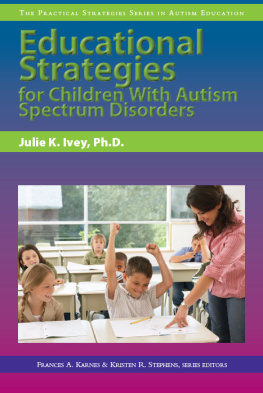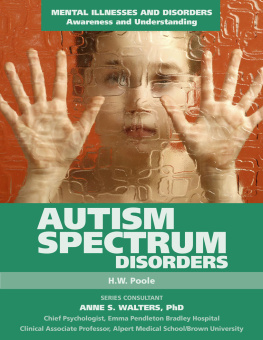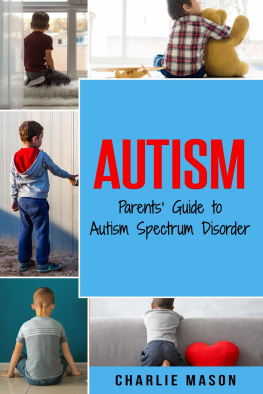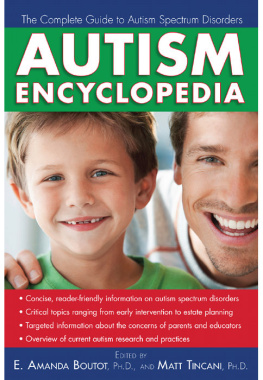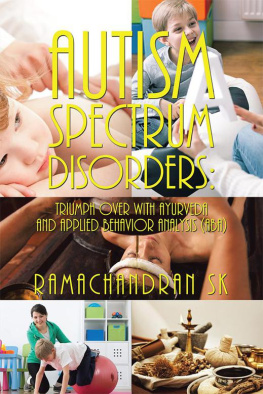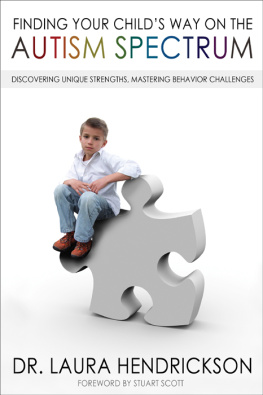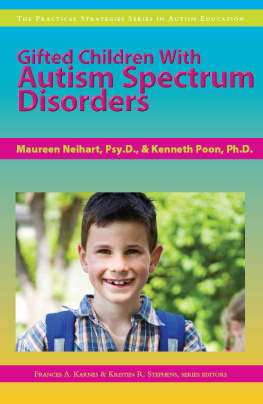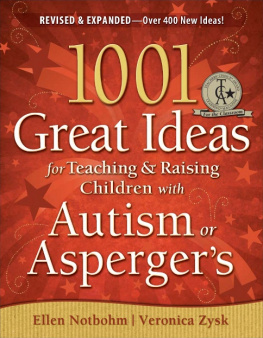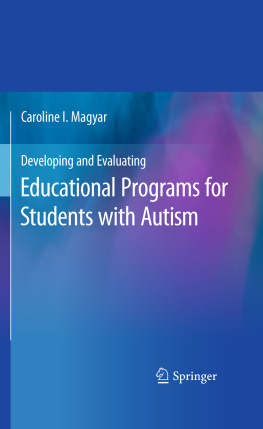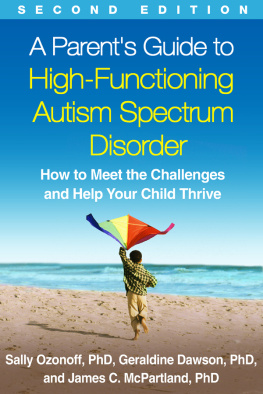RAISING Resilient CHILDREN with AUTISM SPECTRUM DISORDERS
RAISING Resilient CHILDREN with AUTISM SPECTRUM DISORDERS
Strategies for Helping Them Maximize Their Strengths, Cope with Adversity, and Develop a Social Mindset
ROBERT BROOKS, Ph.D., and SAM GOLDSTEIN, Ph.D.


Copyright 2012 by Robert Brooks and Sam Goldstein. All rights reserved. Except as permitted under the United States Copyright Act of 1976, no part of this publication may be reproduced or distributed in any form or by any means, or stored in a database or retrieval system, without the prior written permission of the publisher.
ISBN: 978-0-07-173986-3
MHID: 0-07-173986-6
The material in this eBook also appears in the print version of this title: ISBN: 978-0-07-138522-0, MHID: 0-07-138522-3.
All trademarks are trademarks of their respective owners. Rather than put a trademark symbol after every occurrence of a trademarked name, we use names in an editorial fashion only, and to the benefit of the trademark owner, with no intention of infringement of the trademark. Where such designations appear in this book, they have been printed with initial caps.
McGraw-Hill eBooks are available at special quantity discounts to use as premiums and sales promotions, or for use in corporate training programs. To contact a representative please e-mail us at bulksales@mcgraw-hill.com.
The information contained in this book is intended to provide helpful and informative material on the subject addressed. It is not intended to serve as a replacement for professional medical advice. Any use of the information in this book is at the readers discretion. The authors and publisher specifi cally disclaim any and all liability arising directly or indirectly from the use or application of any information contained in this book.
Since the case illustrations in this book are taken from both authors clinical and consultation practices and workshops, these examples refer to us in the plural (as we and us), not only to simplify the writing style, but also to acknowledge the contributions of material from both authors professional activities. The names of the patients are fictional to respect confi dentiality.
Poem on 115 are from My Own World, by Ayelet Kantor and June Groden, Autism and Related Developmental Disabilities, Special Interest Group (SIG) Newsletter, Volume 23, Issue 3 (Summer 2007). Reprinted with permission.
TERMS OF USE
This is a copyrighted work and The McGraw-Hill Companies, Inc. (McGrawHill) and its licensors reserve all rights in and to the work. Use of this work is subject to these terms. Except as permitted under the Copyright Act of 1976 and the right to store and retrieve one copy of the work, you may not decompile, disassemble, reverse engineer, reproduce, modify, create derivative works based upon, transmit, distribute, disseminate, sell, publish or sublicense the work or any part of it without McGraw-Hills prior consent. You may use the work for your own noncommercial and personal use; any other use of the work is strictly prohibited. Your right to use the work may be terminated if you fail to comply with these terms.
THE WORK IS PROVIDED AS IS. McGRAW-HILL AND ITS LICENSORS MAKE NO GUARANTEES OR WARRANTIES AS TO THE ACCURACY, ADEQUACY OR COMPLETENESS OF OR RESULTS TO BE OBTAINED FROM USING THE WORK, INCLUDING ANY INFORMATION THAT CAN BE ACCESSED THROUGH THE WORK VIA HYPERLINK OR OTHERWISE, AND EXPRESSLY DISCLAIM ANY WARRANTY, EXPRESS OR IMPLIED, INCLUDING BUT NOT LIMITED TO IMPLIED WARRANTIES OF MERCHANTABILITY OR FITNESS FOR A PARTICULAR PURPOSE. McGraw-Hill and its licensors do not warrant or guarantee that the functions contained in the work will meet your requirements or that its operation will be uninterrupted or error free. Neither McGraw-Hill nor its licensors shall be liable to you or anyone else for any inaccuracy, error or omission, regardless of cause, in the work or for any damages resulting therefrom. McGraw-Hill has no responsibility for the content of any information accessed through the work. Under no circumstances shall McGraw-Hill and/or its licensors be liable for any indirect, incidental, special, punitive, consequential or similar damages that result from the use of or inability to use the work, even if any of them has been advised of the possibility of such damages. This limitation of liability shall apply to any claim or cause whatsoever whether such claim or cause arises in contract, tort or otherwise.
With love to my wife, sons, daughters-in-law, and grandchildren, who continue to be a source of joy and inspiration, and in the memory of Drs. John Bauer and Mort Wiener, two of my early mentors in psychology whose influence is represented in all of my work.
R.B.
With love to my children and their partners, and to my new partner, Sherrie, for her support and inspiration.
S.G.
Contents
Preface
In the fall of 1978, coauthor Sam started his clinical internship at the Childrens Center, a facility founded in Salt Lake City by Dr. Agnes Plenk and devoted to the treatment of preschool children with emotional and behavioral problems. Ben, a four-year-old, was one of the first cases assigned to Sam. Left to his own devices, Ben wandered around the playroom rarely picking up a toy. If he did so he looked at it briefly, spun it around, and typically dropped it on the floor. Ben did not respond to his name. He was minimally toilet trained. He rarely made eye contact or demonstrated facial expressions directed at others. He flapped his hands and laughed routinely at phantoms. Ben rarely spoke. When he did speak it was in repetitive phrases using words he had heard listening to television or radio. Despite efforts at engagement, Ben seemed to resist any approach to play with Sam. He seemed preoccupied with one small car he carried around and became quite upset if the car was removed from his grasp.
Sam was assigned the job of preparing Ben to participate in the preschool group. Help him learn to socialize, Plenk advised him. Sam inquired about the source of Bens problems. He was told that Ben might have autism, a rare childhood disorder, but more likely suffered from childhood schizophrenia, a condition at that time for which there was no cure nor effective medications.
One day Plenk observed Sam using Froot Loops as a reinforcer to shape Bens behavior to sit in a chair, something Sam had learned in graduate school during clinical training. Plenk stormed into the room and grabbed the Froot Loops away from Sam, admonishing him that this is not UCLA and we are not Dr. Lovaas. We dont use food or other reinforcers to shape the behavior of children like these. She advised Sam the solution to Bens problems was in his patient approach to Ben and his ability to ultimately develop a working relationship with Ben absent primary reinforcers. Though Sam learned many importat strategies from Dr. Plenk that he has used throughout his career, ways to help children like Ben were not among them. Sam was not very successful in shaping Bens behavior that year.
When we look back on our earliest experiences with children on the autism spectrum, we are struck by our ignorance in understanding and appreciating the early needs of these children to receive a combination of behavioral shaping and appropriate socialization. It has taken nearly thirty-five years, but the medical and mental health fields devoted to researching, understanding, evaluating, and treating children on the autism spectrum are, we believe, finally getting it right. Autism is not a condition caused by refrigerator mothers or dysfunctional parenting; it is not a condition that matures and fades away if left alone; it is not a condition that simply requires behavioral shaping; nor is it a condition that simply requires that we get down on the floor, roll around, and self-stimulate along with the most impaired of these children. We have come to realize that as a developmental disorder, autism is a condition best understood as a significant impairment in the development of social interaction and social learning. It impacts children from the very moment of their birth, altering their capacity to develop normal relationships and impeding their ability to successfully interact with the world around them.
Next page

